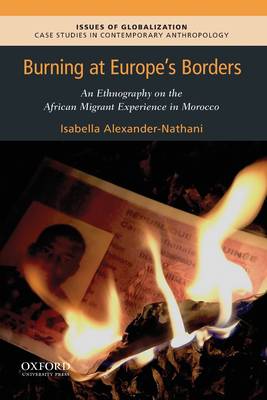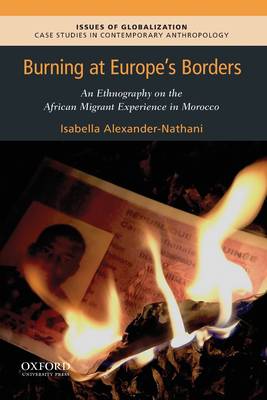
- Retrait gratuit dans votre magasin Club
- 7.000.000 titres dans notre catalogue
- Payer en toute sécurité
- Toujours un magasin près de chez vous
- Retrait gratuit dans votre magasin Club
- 7.000.0000 titres dans notre catalogue
- Payer en toute sécurité
- Toujours un magasin près de chez vous
Burning at Europe's Borders
An Ethnography on the African Migrant Experience in Morocco
Isabella Alexander-Nathani
54,45 €
+ 108 points
Description
In her heart-pounding and courageous debut, Dr. Isabella Alexander-Nathani uncovers an unseen side of our global migrant and refugee crisis. Burning at Europe's Borders invites readers inside the lives of the world's largest population of migrants and refugees--the hundreds of thousands who are trapped in hidden forest camps and forgotten detention centers at Europe's southernmost borders in North Africa. "Hrig," the Arabic term for "illegal immigration," translates to "burning." It signifies a migrant's decision to burn their papers, in order to avoid identification and repatriation on their long journeys to safer shores. But it also signifies their decision to burn their past lives, sacrificing themselves in hopes of reaching a future on the other side of the Mediterranean Sea. Alexander-Nathani examines this process of "burning," traveling thousands of miles alongside those who have fled war and extreme poverty across the African continent only to find themselves trapped in Libya, Algeria, and Morocco. This book exposes the political agreements that have led to Europe's control over African borders and the illicit practices that continue to mold North African countries into brutal holding cells for our world's most vulnerable. Burning at Europe's Borders introduces new ways of doing anthropological research in the modern era, as Alexander-Nathani skillfully weaves images and individual stories into her analysis of changing migration flows at our world's most critical border crossings. Her creative mixed-methods approach included community filmmaking practices and over three years of ethnographic research in African smuggling rings, hidden migrant brotherhoods, and European Union-funded detention centers. This is an ideal cross-over book, promising to engage students, scholars, policymakers, and popular audiences seeking to step inside the heart of our world's greatest humanitarian crisis. Burning at Europe's Borders is a volume in the series ISSUES OF GLOBALIZATION: CASE STUDIES IN CONTEMPORARY ANTHROPOLOGY, which examines the experiences of individual communities in our contemporary world. Each volume offers a brief and engaging exploration of a particular issue arising from globalization and its cultural, political, and economic effects on certain peoples or groups.
Spécifications
Parties prenantes
- Auteur(s) :
- Editeur:
Contenu
- Nombre de pages :
- 288
- Langue:
- Anglais
- Collection :
Caractéristiques
- EAN:
- 9780190074647
- Date de parution :
- 20-01-20
- Format:
- Livre broché
- Format numérique:
- Trade paperback (VS)
- Dimensions :
- 137 mm x 208 mm
- Poids :
- 294 g

Les avis
Nous publions uniquement les avis qui respectent les conditions requises. Consultez nos conditions pour les avis.






